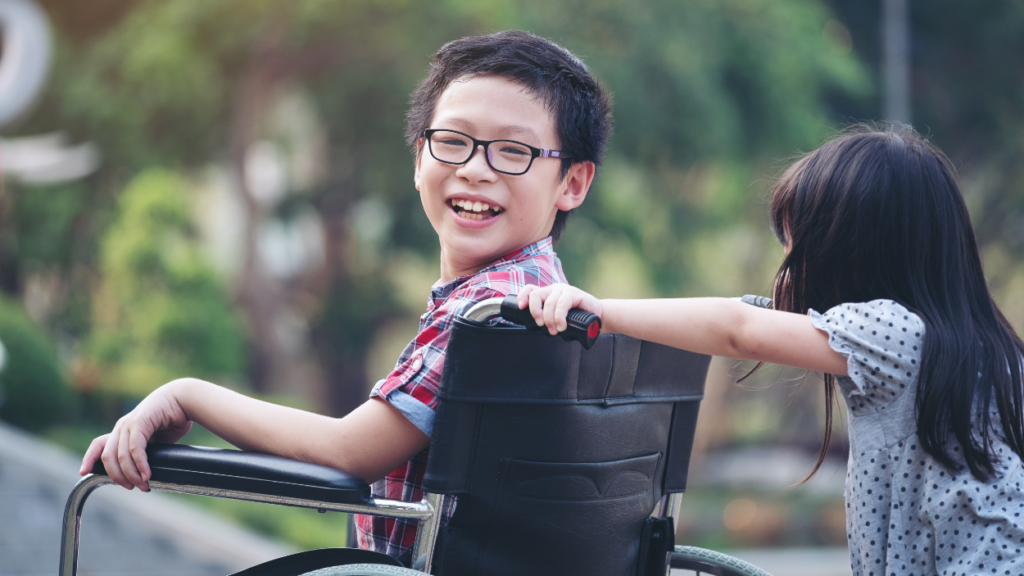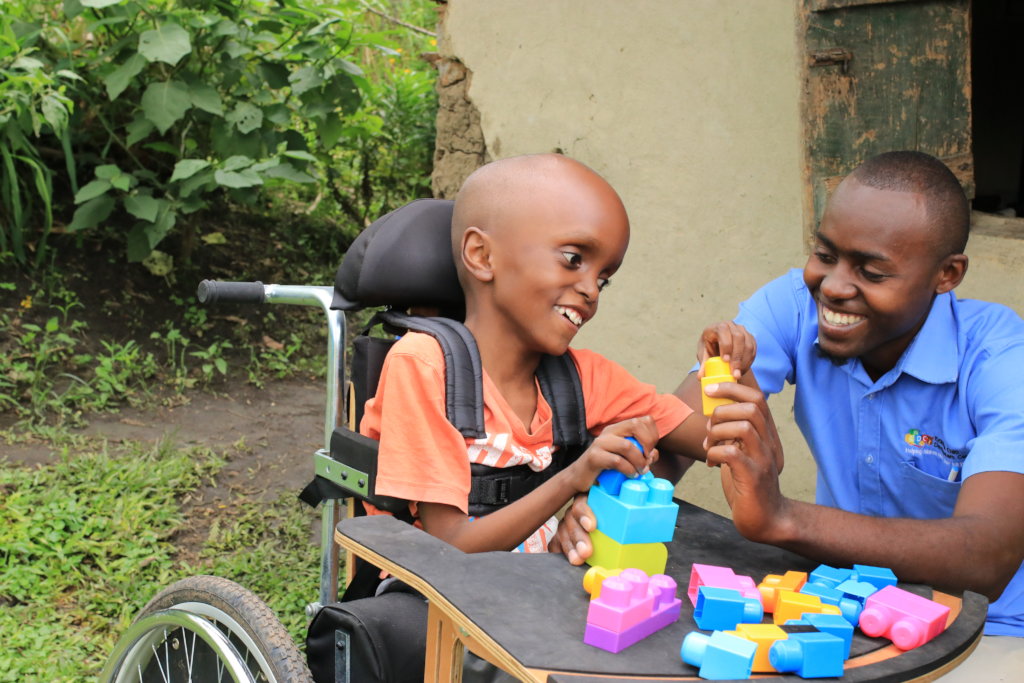
Ways to Support and Empower Disabled Individuals in Society.
1: How can disabled individuals contribute to society?
Ans. Disabled individuals can contribute to society in various ways, such as through their unique perspectives, talents, skills, and experiences.
2: Why is it important to help disabled persons?
Ans.It is important to help disabled persons to ensure their rights, promote inclusivity, and provide equal opportunities for all members of society.
3: How can disabled individuals benefit from receiving help?
Ans.Disabled individuals can benefit from receiving help as it can improve their quality of life, enhance their independence, facilitate their inclusion, and support their overall well-being.
4: How can society benefit from helping disabled individuals?
Ans.Society can benefit from helping disabled individuals by fostering social cohesion, promoting diversity, and tapping into the talents and potential that would otherwise remain untapped.
5: How can we support disabled individuals in finding employment?
Ans.We can support disabled individuals in finding employment by promoting inclusive hiring practices, providing workplace accommodations, offering skills training and development programs, and combating discrimination.
6: How can we ensure that disabled individuals have equal access to education?
Ans .We can ensure that disabled individuals have equal access to education through the provision of accessible educational materials, inclusive school environments, appropriate support services, and reasonable accommodations.
7: How can we promote inclusivity and acceptance of disabled individuals in society?
Ans.We can promote inclusivity and acceptance of disabled individuals in society by raising awareness, challenging societal biases and stereotypes, advocating for their rights, and creating inclusive policies and environments.
8: How can the community support disabled individuals in living independently?
Ans.The community can support disabled individuals in living independently by providing accessible housing options, ensuring transportation accessibility, offering personal assistance services, and fostering a supportive network.
9: How can we make public spaces more accessible for disabled individuals?
Ans We can make public spaces more accessible for disabled individuals by implementing ramps and elevators, providing accessible parking spaces, installing audio-visual aids, and considering their needs in architectural designs.
10: How can we ensure healthcare services are accessible to disabled individuals?
Ans We can ensure healthcare services are accessible to disabled individuals by improving physical accessibility of healthcare facilities, training healthcare providers on disability-specific needs, and promoting disability-friendly policies.
11: What role can technology play in supporting disabled individuals?
Ans.Technology can play a vital role in supporting disabled individuals by providing assistive devices, facilitating communication, improving mobility, and promoting independence.
12: How can we address the stigma associated with disabilities?
Ans.We can address the stigma associated with disabilities through education, awareness campaigns, promoting positive representation, amplifying disabled voices, and fostering inclusive attitudes.
13: What rights do disabled individuals have?
Ans.Disabled individuals have the right to equality, non-discrimination, equal access to education, employment, healthcare, and public services. These rights are protected under various international and national laws and conventions.
14: How can we ensure that disabled individuals have a voice in decision-making processes?
Ans.We can ensure that disabled individuals have a voice in decision-making processes by involving them in policy development, creating platforms for their representation, and valuing their input in matters that affect their lives.
15: How can we empower disabled individuals to advocate for their rights?
Ans .We can empower disabled individuals to advocate for their rights by providing them with resources, information, and support networks. We can also encourage their participation in disability rights organizations and ensure their voices are heard and respected.
16: What are some challenges faced by disabled individuals in daily life?
Ans.Some challenges faced by disabled individuals in daily life can include physical barriers, lack of accessibility, social exclusion, discrimination, limited employment opportunities, and limited access to healthcare services.
17: How can we improve public transportation for disabled individuals?
Ans .We can improve public transportation for disabled individuals by ensuring accessible entrances and exits, providing ramps or lifts on buses, offering priority seating, and training staff to assist disabled passengers.
18: What are some examples of assistive devices that can improve the lives of disabled individuals?
Ans.Examples of assistive devices that can improve the lives of disabled individuals include wheelchairs, hearing aids, prosthetic limbs, communication aids, mobility aids, and adaptive technology.
19: How can we promote social interaction and inclusion for disabled individuals?
Ans.We can promote social interaction and inclusion for disabled individuals by organizing inclusive events and activities, creating social support networks, encouraging participation in community programs, and fostering a welcoming and inclusive environment.
20: How can schools accommodate the needs of disabled students?
Ans.Schools can accommodate the needs of disabled students by providing accessible classrooms, assistive technology, inclusive curriculum, accessible transportation options, and individualized support services.
21: What role can family and friends play in supporting disabled individuals?
Ans.Family and friends can play a crucial role in supporting disabled individuals by providing emotional support, assisting with daily tasks, advocating for their needs, and promoting their overall well-being.

22: What are some misconceptions about disabled individuals?
Ans.Some misconceptions about disabled individuals include assumptions about their capabilities, assuming they all have the same needs, paternalistic attitudes, and underestimating their potential contributions to society.
23: How can workplaces promote inclusivity and accommodation for disabled employees?
Workplaces can promote inclusivity and accommodation for disabled employees by implementing inclusive hiring practices, providing reasonable accommodations, ensuring accessible workspaces, and fostering a culture of respect and diversity.
24: What types of programs and services are available to support disabled individuals?
There are various programs and services available to support disabled individuals, including vocational rehabilitation programs, independent living centers, disability advocacy organizations, counseling services, and support groups.
25: How can we ensure the rights of disabled individuals are protected in times of emergency or natural disasters?
We can ensure the rights of disabled individuals are protected in times of emergency or natural disasters by incorporating inclusive emergency protocols, providing accessible evacuation plans, training emergency responders on disability-specific needs, and considering disability accommodations in disaster relief efforts.
26: Can disabled individuals live fulfilling and independent lives?
Yes, disabled individuals can live fulfilling and independent lives with the right support, accommodations, and opportunities. Disability does not define an individual’s worth or potential.
27: How can we improve the representation of disabled individuals in media and entertainment?
We can improve the representation of disabled individuals in media and entertainment by challenging stereotypes, increasing visibility of disabled actors and performers, supporting disabled creators, and promoting inclusive storytelling.
28: How can we ensure accessible and affordable healthcare services for disabled individuals?
We can ensure accessible and affordable healthcare services for disabled individuals by advocating for inclusive healthcare policies, expanding coverage for assistive devices and therapies, and addressing the healthcare needs specific to disabled individuals.
29: How can we create accessible educational materials for visually impaired students?
We can create accessible educational materials for visually impaired students by providing Braille versions of textbooks, employing tactile graphics, utilizing audio recordings, and incorporating assistive technology.
30: How can we promote positive interactions between disabled and non-disabled individuals?
We can promote positive interactions between disabled and non-disabled individuals by encouraging open-mindedness, educating on disability-related topics, fostering empathy and understanding, and promoting opportunities for meaningful engagement.
31: How can we support disabled individuals in their pursuit of recreation and sports activities?
We can support disabled individuals in their pursuit of recreation and sports activities by providing accessible sports facilities, adapting equipment to meet their specific needs, offering adaptive sports programs, and promoting the inclusion of disabled athletes in mainstream sports.

32: How can we ensure that disabled individuals have access to affordable housing options?
We can ensure that disabled individuals have access to affordable housing options by enforcing accessibility standards in housing construction, offering housing subsidies or assistance programs, and promoting universal design principles.
33: How can we address the unique needs of disabled individuals with mental health conditions?
We can address the unique needs of disabled individuals with mental health conditions by increasing mental health services accessibility, reducing stigma around mental health, providing support systems, and offering appropriate accommodations in various settings.
34: How can we promote the rights of disabled individuals in developing countries?
We can promote the rights of disabled individuals in developing countries by advocating for inclusive policies, supporting disability organizations, providing resources for accessibility infrastructure, and assisting with capacity building and training initiatives.
35: How can we improve accessibility in the digital realm for disabled individuals?
We can improve accessibility in the digital realm for disabled individuals by ensuring websites and applications are designed with accessibility features, providing alternative text descriptions for images, incorporating captioning and transcription services, and adhering to web accessibility standards.
36: How can we combat ableism in society?
We can combat ableism in society by challenging ableist attitudes and behaviors, educating others about the rights and capabilities of disabled individuals, promoting inclusive language, and supporting disabled-led initiatives.
37: How can we foster an inclusive education system for disabled children?
We can foster an inclusive education system for disabled children by providing teacher training on inclusive education, adapting teaching strategies and materials to accommodate diverse needs, promoting positive attitudes towards disabled students, and creating a supportive learning environment.
38: How can government policies and legislation support the rights of disabled individuals?
Government policies and legislation can support the rights of disabled individuals by instituting anti-discrimination laws, enacting accessibility standards, providing funding for support services, and promoting inclusive education and employment practices.
39: How can we promote independence and self-advocacy skills in disabled individuals?
We can promote independence and self-advocacy skills in disabled individuals by encouraging personal decision-making, providing opportunities for choice and autonomy, offering skills training and support systems, and fostering a culture of empowerment.
40: How can we ensure that disabled individuals have access to appropriate assistive technologies?
We can ensure that disabled individuals have access to appropriate assistive technologies by offering financial assistance programs, collaborating with technology manufacturers to develop affordable options, and providing resources for assessment, training, and ongoing support.
41: How can we promote equal access to recreational spaces for disabled individuals?
We can promote equal access to recreational spaces for disabled individuals by ensuring the availability of adaptive equipment, offering inclusive programming, providing accessible paths and routes, and promoting the importance of providing accommodations for all individuals
All Categories
- Agricultural Methods
- Agriculture and Women Small Farmers Rights Awareness
- Climate Change
- Disable and Human Rights
- Disable Jobs
- Donation
- Education
- Health Issues
- Organic Foods
- Organic Vegetables
- Orphans Children
- Plastic production and disposal
- Services
- Sinking in Scarcity
- Success Stories
- Uncategorized
- Waste Management
- Women Rights
- Youth Empowerment




